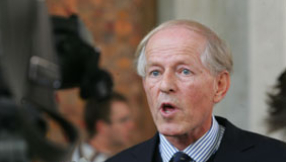Yoram Hazony, leading conservative thinker and author of The Virtue of Nationalism, has recently been at large promoting a form of conservatism that appears to embrace relativism.
Dubbing his view 'Conservative Democracy', Hazony characterises this conservatism as rejecting the following three 'liberal axioms':
1. Universally valid human reason, such that 'by reasoning, [human individuals] are able to discover universal truths that hold across all human societies and in every historical time frame.'
2. Basic human equality and freedom entailing 'universal rights'.
3. Government justified by the consent of the governed.
Now I count myself a conservative, but I confess to signing up to all three of these. In fact, I deem the first to be an irreducible requirement of any reasoning oriented to truth. The second I would say is a basic principle of the natural moral law founded on the dignity of humanity made in the image of God – for all people are morally entitled not to be murdered, robbed, and so on (this is not to endorse all the progressive made-up 'rights' with which modern society is afflicted). As to the third, it hardly seems controversial to consider government to exist for the public good, or to think it casts a shadow over its own legitimacy if it sets itself against the public interest and loses public confidence.
Hazony, however, appears to disagree. His view is that it is precisely this 'Lockean-rationalist' system of liberal axioms that lies at the root of the malaise in Western culture and politics and prevents it from taking its proper conservative course. For him, conservatives are people who reject these axioms and strive instead 'to defend and build up the political and intellectual traditions of [their] own tribe or nation'. Thus for Hazony the essential difference between liberals and conservatives is that liberals believe in universal truths of reason, universal rights and government by consent, whereas conservatives believe in preserving and perpetuating the traditions of their own group or nation. Hazony gives no indication that he considers these traditions to be amenable to rational justification, describing human reason as 'weak, capable only of local knowledge, and generally unreliable'.
To my mind this is not a happy position from which to attempt a defence of conservatism. After all, to defend something rationally is to set out reasons for why it has features that are deemed to make it true and good. Otherwise all we have is relativism, where a culture 'justifies' itself by reference only to its own internal ideas, which may or may not be good or true from any wider or absolute perspective.

Hazony appears to recognise this problem, in a way. He allows that 'foolish' parts of national traditions may be repaired, but only 'on the basis of principles internal to the existing order'. Which acknowledges the difficulty, but only to ignore it. For what if the principles internal to the existing order are wrong, or based on falsehood? Hazony may say that human reason is not competent to know whether or not this is the case. But how does he know that? Even under his own account, human reason must be at least competent to recognise its own shortcomings, which constitutes one universal truth about humanity. How then can Hazony deny that reasoning to universal truths is possible, when his own theory rests on at least one universal truth of its own, namely the limitations of human reason? This is the usual pitfall of relativist theories, of course: the relativist viewpoint is self-contradictory since it must at least be absolute in its claim that all things are relative.
In any case, though, conservatives are not relativists. Quite the contrary, relativism is one of the great errors of the cultural and progressive Left, with their multicultural and postmodern dogmas, that conservatives stand against. Conservatives believe in seeking truth (both scientific and moral) and running society in line with this truth, standing by all that is tried and tested and has proved its worth. They reject the progressive notion of experimenting with human nature in an effort to reach a utopia of perfect freedom and equality, where each person defines their own sense of identity and meaning of existence, which is both impossible to achieve and often harmful in the attempt.
Hazony also opposes this Left-liberal utopianism, of course. But his conservative alternative fails to avoid committing the same relativist fallacy. In saying this, I don't wish to take away from what Hazony gets right. He is on the money in criticising post-war liberalism for its crude reduction of the Western political tradition to a small number of axioms that are supposedly neutral but really are no such thing, and its consequent abandonment of the importance of the family, religion and the nation state. However, there is no need to resort to relativism or anything like it to make this point.
Where Hazony goes wrong is in his contention that the problems in Western society stem from the jettisoning of a conservative philosophy that eschews universal truth claims. In reality, the chief culprit was the wholesale abandonment of God amongst Western elites, with a 'new liberalism' emerging around the turn of the 20<sup>th century that purported to be a 'neutral' approach to human life and politics – a neutrality that was supposedly expressed in being radically secularist (so anti-religion), radically permissive (so anti-family) and radically internationalist (so anti-nation state). Left-liberalism also became heavily intermingled with Marxist and post-Marxist streams of thought which pushed it in yet more radical directions, further compromising its spurious 'neutrality'.
In countering this corrosive Leftist creed, conservatives like Hazony do us no favours by adopting a relativist outlook, or coming out against such staples as universal truth, basic rights and government by consent. We need a conservatism grounded in the eternal verities of human nature as God has created it, not in anything resembling relativism, which will always be a foundation of sand.
Dr Will Jones is a Birmingham-based writer, a mathematics graduate with a PhD in political philosophy and a diploma in biblical and theological studies. He blogs at www.faith-and-politics.com and is author of Evangelical Social Theology: Past and Present (Grove, 2017). He can be found on Twitter @faithnpolitic













